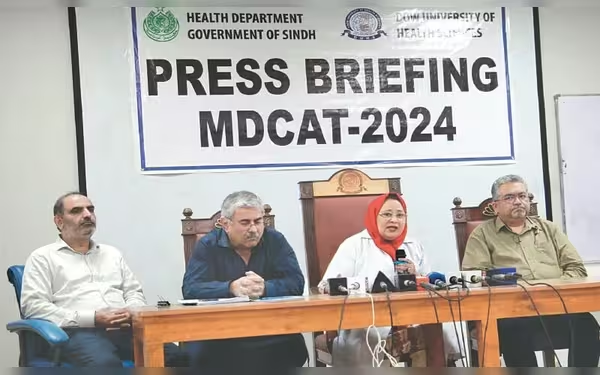Thursday, November 7, 2024 07:37 AM
PMDC Takes Action to Resolve MDCAT Issues
- PMDC to conduct independent MDCAT analysis next year.
- Allegations of question paper leak and syllabus discrepancies arise.
- Sindh High Court summons officials over MDCAT controversies.
 Image Credits: dawn
Image Credits: dawnPMDC addresses MDCAT controversies with plans for independent analysis and standardized testing to ensure fairness.
In recent weeks, the Medical and Dental Colleges Admission Test (MDCAT) has been at the center of a significant controversy in Pakistan. This test is crucial for students aspiring to gain admission into medical and dental colleges across the country. However, the integrity of the examination has come under scrutiny following allegations of a question paper leak and discrepancies in the difficulty level of the test administered by different universities.
The Pakistan Medical and Dental Council (PMDC) has taken decisive steps to address these concerns. In a bid to ensure fairness and uniformity, the PMDC has announced plans to conduct an independent analysis of the MDCAT. Starting next year, the council aims to provide the same set of questions to all candidates nationwide. This initiative will involve the creation of a new question bank in collaboration with the Inter-Boards Coordination Commission (IBCC) and the Higher Education Commission (HEC).
On September 22, approximately 170,000 candidates took the MDCAT, which was conducted by six universities both in Pakistan and abroad. Following the examination, numerous complaints surfaced, particularly from candidates in Sindh, alleging that the question paper had been leaked and that over 20 questions were outside the prescribed syllabus. The Shaheed Zulfikar Ali Bhutto Medical University (SZABMU) in Islamabad faced specific criticism for these issues.
In response to the complaints, the President of the Azad Kashmir College Teachers’ Association, Prof. Tariq Saleem, formally addressed the SZABMU and representatives of the Azad Jammu and Kashmir government, highlighting the distress caused to candidates due to multiple errors in the examination paper. Furthermore, a bench of the Sindh High Court has summoned key officials, including the chief secretary and health secretary, to appear on October 9 to address the allegations surrounding the paper leak.
As candidates began filing complaints with both the university and the PMDC, reports emerged that some students had achieved near-perfect scores, raising further suspicions about the integrity of the examination process. Dr. Tariq Iqbal, the vice chancellor of SZABMU, confirmed that around 210 complaints had been received and were under review by an independent committee of subject specialists.
In a statement, SZABMU assured the public that all necessary measures had been taken to ensure a smooth and transparent examination process. The university claimed to have employed sufficient invigilation staff and implemented logistical and technological support to prevent any breaches of exam integrity.
Despite these assurances, candidates expressed their dissatisfaction, suggesting that if a retake of the test was not feasible, the university should consider awarding a minimum score to all students. A senior PMDC official, who preferred to remain anonymous, indicated that a meeting had been convened to discuss the results of the MDCAT across different regions, revealing a disparity in performance levels.
Looking ahead, the PMDC's commitment to developing its own question bank and standardizing the examination process is a positive step towards restoring confidence in the MDCAT. By ensuring that all candidates face the same level of difficulty, the council aims to eliminate any perceived biases and enhance the credibility of the admission process.
While the recent controversies surrounding the MDCAT have raised serious concerns, the proactive measures being implemented by the PMDC signal a commitment to fairness and transparency in medical education. As the council works towards a more standardized testing approach, it is essential for all stakeholders, including students, educators, and policymakers, to remain engaged in the dialogue to ensure that the integrity of the examination process is upheld for future generations.













